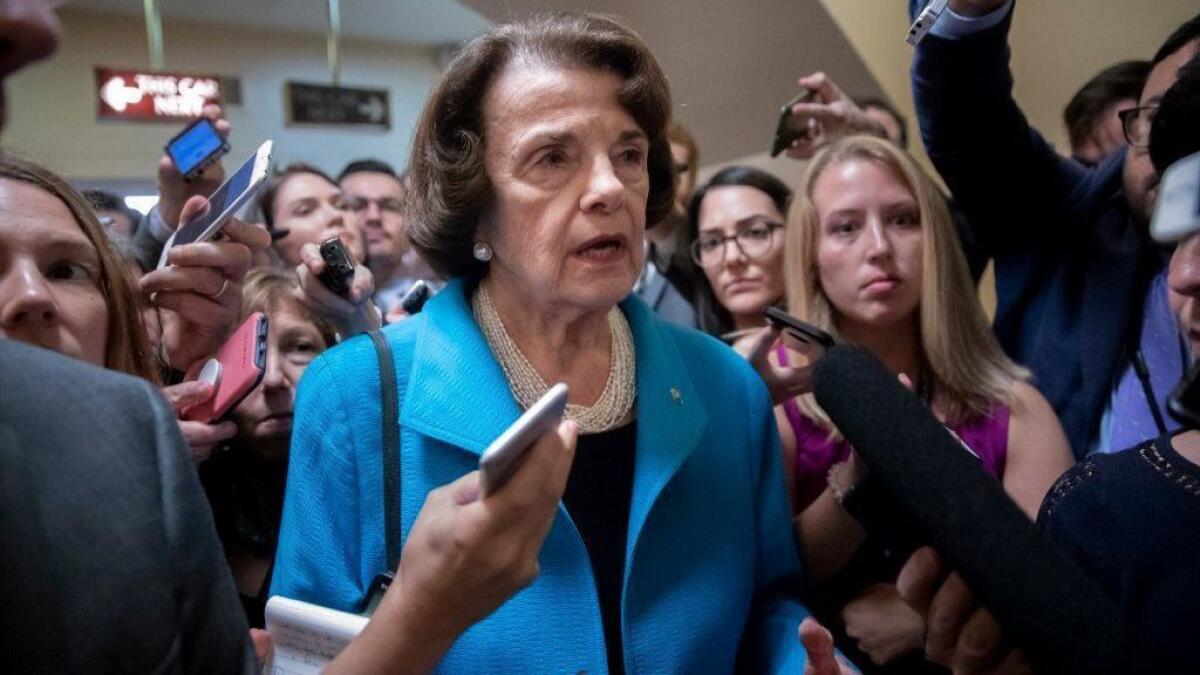Should the San Francisco school board ‘cancel’ Sen. Dianne Feinstein?

- Share via
If it had been up to me, I wouldn’t have named a San Francisco elementary school after Sen. Dianne Feinstein. As a general rule, it feels unseemly and premature — not to mention risky — to name schools and parks and buildings for living people.
Remember the Richard Nixon Freeway, which had to be hastily renamed the Marina Freeway after the president’s resignation in disgrace in 1974? And the building named after Jeffrey Epstein at the Interlochen Center for the Arts?
All in all, it’s better to wait until people are dead before building monuments to them.
But in the case of Dianne Feinstein Elementary School in San Francisco, the deed is already done. The school was named for her 14 years ago, and renaming it at this point seems ludicrous. She was, after all, the first female mayor of the city where the school is located, and she’s a well-regarded liberal politician who’s been elected by Californians to the U.S. Senate six consecutive times.
But Feinstein got caught up in the school district’s current project to rebrand schools that bear the names of historical figures who can’t stand up to modern scrutiny — colonizers, environmental abusers, human rights violators and the like. Earlier this year, a committee began to consider the relevance and appropriateness of school names, and it has now put forward a list of 42 schools it believes should be renamed.
The schools include one named after President Roosevelt — the committee doesn’t know which Roosevelt it’s named for, but apparently neither Teddy nor FDR is acceptable. There’s also George Washington High School (“slaveowner, colonizer,” say the committee’s terse notes summarizing reasons for the recommendations). Also schools named for Abraham Lincoln, Thomas Jefferson, Paul Revere and Feinstein, among others.
Each of the schools has been asked to propose alternative names for itself by Dec. 18, preferably names grounded in “social and economic justice.” Ultimately the school board will have to sign off on any changes.
It is entirely reasonable to reconsider school names. Attitudes evolve. History is reviewed and revised, and yesterday’s heroes won’t always be those we admire most today. Public schools have too often been named for white men who don’t look like the students who study there. Worse, they have sometimes been named for people best known for dishonorable, offensive or racist behavior.
If someone is known principally for their misdeeds, they don’t deserve to be honored. Robert E. Lee? His name shouldn’t be on any school anywhere. If the legacy of Spanish missionary Junipero Serra is not something we can reasonably praise or defend, then let’s strip away his name.
But it strikes me as excessive that Abraham Lincoln, the man many consider to be America’s greatest president because of his leadership in the war to end slavery, should have his name removed because of his policies toward native peoples and Indian nations. There’s no doubt that U.S. treatment of Native Americans from the moment European settlers landed was appalling, and under Lincoln, the mistreatment continued. But that’s not Lincoln’s great legacy, nor is it why we honor him. The end of slavery is.
Similarly (assuming the school is named for Franklin Roosevelt rather than Theodore Roosevelt), do we really want to cancel the president who guided us out of the Great Depression and through World War II because he ordered the internment of people of Japanese descent? That was a racist and misguided decision, but can’t we agree there is more to FDR than his most enormous mistake?
These figures — and Washington and Jefferson! — need to be viewed in their totality and in their historical contexts.
Their flaws should not be ignored. Unquestionably their attitudes toward Black people, Jews, immigrants, women, the poor and native peoples were very different from our own today. Washington and Jefferson were slave owners, and all Americans should be taught that.
But “present-mindedness,” as historians sometimes call it, comes with its own problems.
What figure from the past can meet the tests of today? You’d be hard-pressed to find a leader of the 1960s civil rights movement who supported gay marriage or the rights of transgender people.
It is important to consider the times in which people lived, and to balance accomplishments and shortcomings. And we can honor people for the former while condemning the latter.
As for Dianne Feinstein, she’s not a slaveholder or an opponent of LGBTQ rights or a despoiler of the earth. Her accomplishments since entering public service in the late 1960s are many.
Nor is she beyond reproach. No one is.
The renaming committee raised two arguments against Feinstein. One involved a Confederate flag that had flown outside San Francisco’s convention center since 1964 as part of an 18-flag display and that was taken down once and for all in 1984 on Feinstein’s orders while she was mayor. The complaint is that before she took it down, she left it up. Indeed, when a protester tore it down, it was replaced. But, a few days later, after complaints and intervention from an African American member of the city’s Board of Supervisors, Feinstein announced that the flag would no longer be flown.
That doesn’t seem disqualifying to me.
A second concern about Feinstein has to do with the eviction of a group of retired Filipino seamen from an SRO hotel in the late 1970s. Tom Mentzer, a spokesman for Feinstein, said the evictions occurred before she was mayor.
San Francisco Mayor London Breed noted that for the school district to expend energy and resources on the renamings in the middle of a global pandemic that had shuttered schools was “offensive.”
When you see what the committee has come up with, it’s hard not to agree.
More to Read
A cure for the common opinion
Get thought-provoking perspectives with our weekly newsletter.
You may occasionally receive promotional content from the Los Angeles Times.










